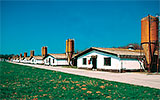Agriculture
Agriculture has long been a major source of income for many people living in the Danube River Basin. But today agriculture is also a major source of pollutants including fertilisers and pesticides, as well as effluent from huge pig farms and agro-industrial units.
Animal breeding and manuare disposal are important agricultural point sources of agriculture pollution.
Inappropriate agricultural practices in some areas have polluted rivers and groundwater, and led to soil erosion. Many wetlands have been converted into farmland, drained, contaminated or otherwise degraded. Fertile topsoils have also been eroded in many agricultural regions. These changes have affected the structure and biodiversity of ecosystems. Unsustainable agricultural practices also reduce the standard of living for farmers and rural communities in the long term.
The modernisation and intensification of agriculture in the new EU countries is expected to bring about an increase in the loads of agricultural pollutants affecting the Danube and the Back Sea.
Did you know?
The fertile lowlands along the middle and lower reaches of the Danube rank among the most important agricultural regions in Europe.
The agricultural water protection measures, as set out in the Joint Action Programme (JAP) as well as in the draft Danube River Basin Managment Plan address both point and diffuse sources of pollution.
To combat agricultural pollution, the ICPDR compiled an inventory of all relevant point discharges of agriculture, designed to serve as a tool for decision-makers and the local environmental and agricultural authorities to control pollution and improve water quality in the Danube.
ICPDR recommendations on best agro-industrial techniques address the following issues:
- Development and implementation of good agricultural practice
- Aadequate use of pesticides and fertilisers
- Proper storage and handling of manure
- Proper treatment of wastewater discharges from farms
- Reductions in run-off and erosion
- Promotion of organic farming
- Proper operation of irrigation and drainage systems
- Suitable restoration, management and conservation of wetlands
In 2004 the ICPDR issued an additional recommendation of Best Available Techniques at agro-industrial units.
Disclaimer
The information contained in the ICPDR website is intended to enhance public access to information about the ICPDR and the Danube River. The information is correct to the best of the knowledge of the ICPDR Secretariat. If errors are brought to our attention we will try to correct them.
The ICPDR, expert group members, nor other parties involved in preparation of information contained on this website cannot, however, be held responsible for the correctness and validity of the data and information provided, nor accept responsibility or liability for damages or losses arising directly or indirectly from the use of the information conveyed therein.
Only those documents clearly marked ICPDR documents reflect the position of the ICPDR.
Any links to other websites are provided for your convenience only. The ICPDR does not accept any responsibility for the accuracy, availability, or appropriateness to the user's purposes, of any information or services on any other website.
When using the information and material provided on this website, credit should be given to the ICPDR.

